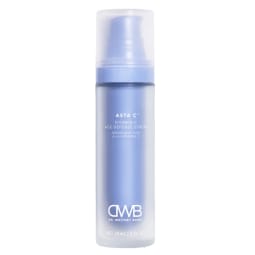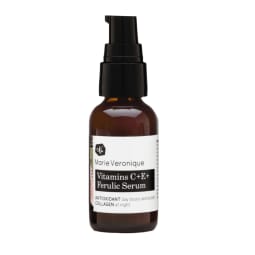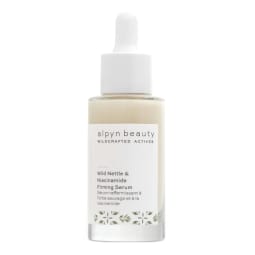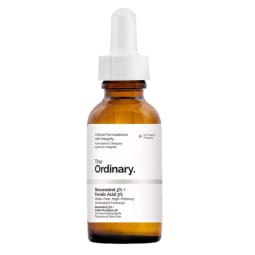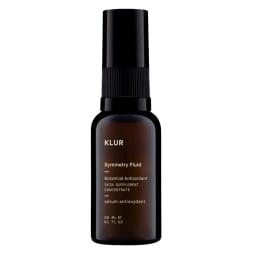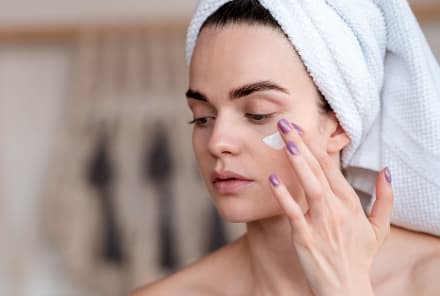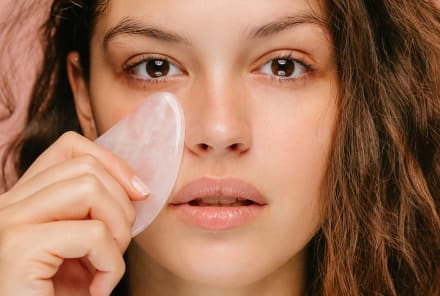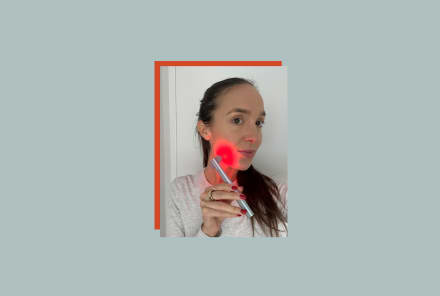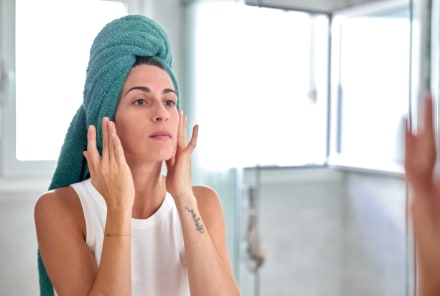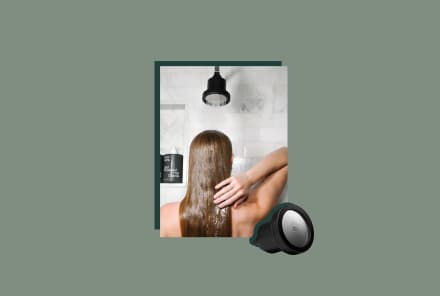Advertisement
Antioxidants & Your Skin Health — "The More The Better," Say Derms

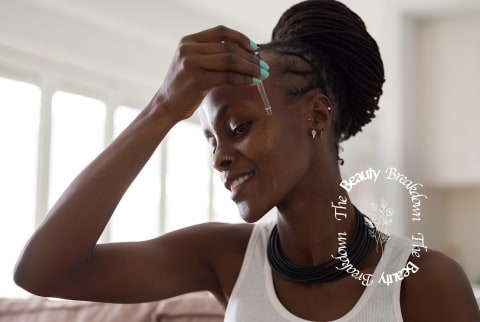
If you're reading this, I'm going to wager that you're using an antioxidant in your skin care routine. You may not even realize it's there, but tucked away in one of your face creams, cleansers, serums, or even makeup formulas is an ingredient with antioxidant properties—placed there by a cosmetic chemist who knew your skin would be craving it.
Antioxidants are widely used in skin care—and they should be. These free-radical-fighting powerhouses do wonders for the skin. And even if beauty folk are constantly praising their usage, we rarely get into the nitty-gritty of what they're actually doing in the skin.
So, in this month's installment of the Beauty Breakdown, we're taking a deep dive into antioxidants for your skin.
Editor's note:
The 101 on antioxidants in skin care
An antioxidant is a molecule that inhibits the chemical reaction of oxidation—hence the name, "anti" "oxidant." Oxidation can cause organic matter, like our bodies, to break down. Essentially: Oxidation is our body rusting.
Antioxidants stop this process by scavenging for and neutralizing free radicals in the body. "Free radicals are harmful unstable molecules that can damage your cells or DNA," says board-certified dermatologist Zenovia Gabriel, M.D., FAAD. Free radicals are called "unstable" because they are missing an electron. This is a problem because atoms don't like to have uneven electrons, and when they are unbalanced they wreak havoc.
One way they wreak havoc is they take electrons from healthy cells. Those healthy cells are then turned into, you guessed it, free radicals. The cycle continues.
The cycle, of course, has to start somewhere. The thing is, our body naturally creates free radicals as a byproduct of cell metabolism1. So free radicals are created inherently in the body. But more alarmingly, they also come from external aggressors like UV exposure, smoking, pollution, inflammation, and so on.
This is notable because free radicals change the body—and, notably for this article, the skin. "Free radicals lead to changes in the cell that are recognized as signs of aging: decreased collagen and elastin, increased pore size, increased textural changes and changes in pigmentation," says Morgan Rabach, M.D., board-certified dermatologist and co-founder of LM Medical NYC.
So when you apply antioxidants, they stabilize free radicals by donating an electron. Or they might make free radicals harmless by breaking them down. And what's even more impressive is that antioxidants don't turn into free radicals themselves after giving away an electron.
By stopping the process of damage, antioxidants have a wide range of skin care benefits, ranging from:
- Reduce inflammation
- Protects collagen & elastin
- Supports the skin barrier
- Improves the skin's immune system
- Brightens tone and smooths texture
- Delays photoaging
Clearly, it makes sense why these are so ubiquitous in skin care. "People often ask how many antioxidants you should be using regularly; the answer is: the more the better," says board-certified dermatologist Rachel Nazarian, M.D., of Schweiger Dermatology Group. "The more you can help neutralize unstable molecules caused by free radical formation, the longer you can salvage the health of your cells and skin. There's really no limit to how much you can protect and repair your body!"
The 4 things we're getting wrong about antioxidants
Having an antioxidant in your routine is always the right choice. Unfortunately, there are also many things you can get wrong about usage—that may be getting in the way of their full potential. Here are the most common mistakes we see:
- Considering antioxidants as a monolith. When we say "antioxidants," we mean anything that can neutralize free radicals. But under that broad definition, there are many different kinds of antioxidants—each with its own unique properties. So it's important to find the right set of antioxidants for your particular skin needs.
- Being cavalier with storage. While powerful little things, antioxidants can be finicky—especially unstable ones like vitamin C. While many formulas have stabilizers built into the formula to help counteract this, it's still best practice to store your products correctly. Be sure to keep openings tightly closed so as not to expose the antioxidants to oxygen, store the jars in a cool place, and don't expose them to sunlight for long periods of time.
- Not using them in serum form. Antioxidants make excellent additions to any formula—from face cleansers to makeup. But to get the most out of them, opt for a serum. Serums have the highest concentration of actives and are applied onto clean, bare skin so they have the greatest degree of penetration.
- Skipping sun protection & engaging in oxidative skin care habits. As I've noted, antioxidants protect against oxidation. And some level of oxidation is inevitable and entirely out of our control—such as through external stressors, pollution, or through the body's natural metabolic process. But some oxidation is within our control, such as smoking, inflammatory diets, and UV exposure. Be mindful of how your daily habits are influencing your free radical exposure.
The 8 best antioxidants to use (& how)
As you can probably glean, topical antioxidants do wonders for the skin—here are the best ones to incorporate into your routine, what makes them unique, and tips on how to do so.
Vitamin C & E
Perhaps the most famous synergistic antioxidant duo in skin care, vitamins C and E are vital for the formation of healthy skin. Not only do they neutralize free radicals, but they're vital for collagen and elastin production. Vitamin C plays a role in the collagen synthesis process, and vitamin E can help stop collagen cross-linking (a process by which collagen becomes stiff and brittle) and is the most prevalent fat-soluble vitamin in the skin2.
And when used together, they improve each other's power. One study even found that vitamin E (and ferulic acid) increases vitamin C's effectiveness3 eightfold; on the other hand, vitamin C regenerates vitamin E after the latter scavenges free radicals, further reducing oxidative stress4 to cell membranes.
Niacinamide
Niacinamide (also called nicotinamide) is a B vitamin, more specifically vitamin B5. This buzzy antioxidant has several key differentiators. First up, it can help increase the production of ceramides and fatty acids, two key parts of the skin's barrier. This makes it a valuable ingredient for skin barrier function and hydration. It's also been shown to regulate sebum production5, which may be beneficial for those with congested skin or acne. Finally, studies show that niacinamide inhibits melanosome transfer6, resulting in brighter skin and reduced appearance of dark spots after four weeks of consistent use.
Polyphenols & resveratrol
Polyphenols are antioxidants found in things such as green tea7 as well as certain fruits, vegetables, and other botanicals. There are thousands of polyphenols, but they also contain a handful of similar antioxidant behaviors.
Along with antioxidant properties that defend against oxidative stress, polyphenols also contain anti-inflammatory properties8 that help reduce signs of sensitive skin, like redness or irritation.
One of the most famous polyphenols is resveratrol. This antioxidant is famous for its longevity properties. Research shows it has been found to support healthy aging by activating sirtuins9, which are regulatory genes and key players in cellular aging and longevity. Finally, studies show that it can help deal with UV damage10 and protects skin from photodamage11.
Coenzyme Q10
A vastly underrated antioxidant, CoQ10 is naturally found in all living cells. It is a fat-soluble compound that's found in all your cells that has strong antioxidant properties. What's more, research shows it protects against lipid peroxidation12, a process by which free radicals damage cell membranes leading to a weakened barrier function.
Additionally, the coenzyme plays a role in skin cell energy production, meaning using the ingredient can help skin cells act young and healthy. Your cells need CoQ10 to produce energy13. Specifically, it's used in the mitochondria, or the "powerhouse" of the cell. The energy produced normal cellular functions, including those involved in skin health.
Astaxanthin
Astaxanthin has been dubbed the "King of the Carotenoids." That's because astaxanthin is five times more potent than beta-carotene and a whopping 6,000 times more potent than vitamin C. That's a ton of antioxidant power. Thanks to this, studies show astaxanthin delays the impacts of UV exposure14.
Panthenol (provitamin B5)
When applied to the skin, panthenol is converted to vitamin B5. It's a very common skin care ingredient because it plays well with other ingredients, is fairly stable, and has notable skin benefits.
While it does have antioxidant properties, it's actually most famous for its role as a moisturizer. Research shows that it restores and protects the skin barrier15, largely thanks to the fact that it stimulates fatty acid production. It also protects the skin barrier function and improves wound healing through its anti-inflammatory effects16. Finally, it's been shown to decrease erythema16, or skin reddening, when applied to wounds in the top layer of the skin.
2 extra steps
Daily use is the best way to incorporate antioxidants into your routine. On top of that? Try these:
- HydraFacial: HydraFacials are a multi-modality treatment that exfoliates, hydrates, and infuses serums into the skin. On the serum end, many of the boosts offered by HydraFacial contain antioxidant blends to feed the skin these free radical fighters.
- Ampoules: You can think of ampoules as potent, supercharged serums. In most cases, they have a higher concentration of actives without any fillers or preservatives—as such, they tend to come in single-unit doses housed in tiny vials, meant to be used sparingly for special occasions.
5 editor-approved products
Here are options that give you a potent bouquet of antioxidants.
Why we love it:
- Vitamin C can be hard to tolerate – but this sensitive skin safe
- Refillable packing
- Fragrance free
Editor's note:
- Created by mindbodygreen collective member and board-certified dermatologist Whitney Bowe, M.D., one of my favorite sources for skin care advice
An absolutely dazzling formulation, this antioxidant serum combines two forms of vitamin C—Tetrahexyldecyl Ascorbate (THD Ascorbate) and 3-O-Ethyl Ascorbic Acid (3-O-Ethyl AA)—tested for their efficacy, stability, and gentleness. It’s further supported by astaxanthin and fermented turmeric. This is a brightening powerhouse.
Why we love it:
- It also contains coenzyme Q10 & astaxanthin
- Fragrance free
Editor's note:
- I’ve gone through countless bottles of this serum. It’s an all-time favorite.
In terms of ingredient combinations, vitamins C, E, and ferulic acid are about as famous as they come for collagen production. Vitamin C is a necessary part of the collagen synthesis and cross-linking process. Vitamin E crucially stabilizes the notoriously volatile molecule. Ferulic acid is not only an antioxidant but can help power up other antioxidants—meaning the entire formula becomes more effective. A hat trick, if you will.
Advertisement
Why we love it:
- Contains wild harvested ingredients
- The brand participates in 1% For The Planet and is Carbon Neutral Certified
Lifting and tightening the skin are notoriously difficult concerns to address. This does so with a potent—yet gentle—blend of actives. Of course, there's niacinamide, but it also contains two other lifting ingredients. First, there's the nettle extract, a vitamin C-rich botanical that can help build and protect collagen. There's also a retinol alternative antioxidant called rambutan that can help firm and plump the skin.
Pros
- Budget friendly
- A simple three-ingredient formula
- Water-free, so no preservative system needed
Using just propanediol, resveratrol, and ferulic acid, this powerful anhydrous solution will help smooth texture, firm skin, fade dark spots, restore the skin barrier, and deal with free radical damage. This is an incredibly effective option at a very affordable price point.
Advertisement
Why we love it:
- Uses organic and wild-crafted ingredients
- Fragrance free
- Sustainably packed in the US
Editor's note:
- Crafted by holistic esthetician Lesley Thornton, who is a regular source for mindbodygreen.
This elixir bills itself as a “skin supplement concentrate” and just one look at the ingredient list, you’ll understand why. Using a base of antioxidant rich green and white tea, this layers in nutrient after nutrient such as vitamin C, astaxanthin, ferulic acid, L-Glutathione, red algae, hyaluronic acid, vitamin E, and an assortment of botanical extracts.
The beauty breakdown
If you're now thinking to yourself, Hmm should I add more antioxidants into my routine? Let me just answer that question for you: yes, yes, and yes again. Oxidation is the fundamental driver of aging—and can come from a wide variety of sources, such as UV exposure, pollution, inflammatory diet, stress, and irritating topicals. So, loading up on antioxidants can help the skin fight off these damaging free radicals. Just don't forget to follow up your antioxidant serum with a face cream.
Meet The Experts
16 Sources
- https://www.ncbi.nlm.nih.gov/pmc/articles/PMC3249911/
- https://lpi.oregonstate.edu/mic/health-disease/skin-health/vitamin-E
- https://www.ncbi.nlm.nih.gov/pmc/articles/PMC3673383/
- https://www.ncbi.nlm.nih.gov/pmc/articles/PMC5579659/
- https://www.tandfonline.com/doi/abs/10.1080/14764170600717704?journalCode=ijcl20
- https://pubmed.ncbi.nlm.nih.gov/12100180/
- https://www.ncbi.nlm.nih.gov/pmc/articles/PMC3498696/
- https://www.ncbi.nlm.nih.gov/pubmed/25445538
- https://www.ncbi.nlm.nih.gov/pmc/articles/PMC3799917/
- https://pubmed.ncbi.nlm.nih.gov/18221451/
- https://www.ncbi.nlm.nih.gov/pmc/articles/PMC6098906/
- https://www.ncbi.nlm.nih.gov/pmc/articles/PMC5514578/
- https://www.ncbi.nlm.nih.gov/pmc/articles/PMC4737275/
- https://www.ncbi.nlm.nih.gov/pmc/articles/PMC6073124/
- https://www.tandfonline.com/doi/full/10.1080/09546634.2017.1325310
- https://link.springer.com/article/10.2165/00128071-200203060-00005
Watch Next
Enjoy some of our favorite clips from classes
Enjoy some of our favorite clips from classes
What Is Meditation?
Mindfulness/Spirituality | Light Watkins
Box Breathing
Mindfulness/Spirituality | Gwen Dittmar
What Breathwork Can Address
Mindfulness/Spirituality | Gwen Dittmar
The 8 Limbs of Yoga - What is Asana?
Yoga | Caley Alyssa
Two Standing Postures to Open Up Tight Hips
Yoga | Caley Alyssa
How Plants Can Optimize Athletic Performance
Nutrition | Rich Roll
What to Eat Before a Workout
Nutrition | Rich Roll
How Ayurveda Helps Us Navigate Modern Life
Nutrition | Sahara Rose
Messages About Love & Relationships
Love & Relationships | Esther Perel
Love Languages
Love & Relationships | Esther Perel
